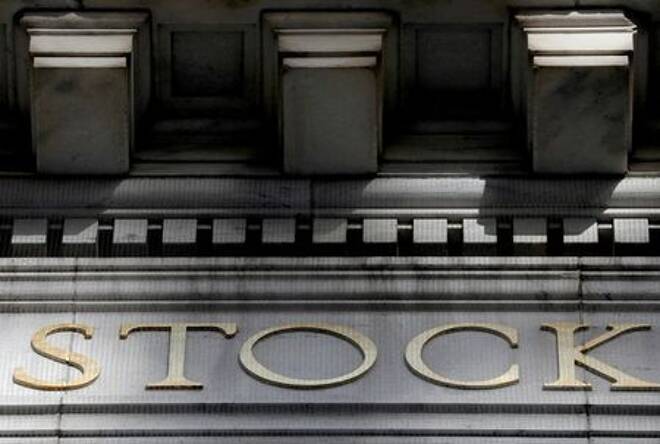Advertisement
Advertisement
Stocks Rebound on Progress Toward U.S. Debt Ceiling Resolution
By:
NEW YORK/LONDON (Reuters) -Soaring energy prices retreated and stocks on Wall Street rebounded on Wednesday after the top U.S. Senate Republican backed an extension of the U.S. debt ceiling and Russia calmed volatile natural gas markets in Europe.
In this article:
The unrelated moves eased growing angst among investors about the possibility of a historic default on U.S. government debt and surging Dutch wholesale gas prices, the European benchmark, that had jumped eightfold this year to record highs.
Rising U.S. and European natural gas prices, along with a surge in crude oil, had fueled a rising inflation outlook that also was stoked by a persistent disruption of supply chains for manufactured goods.
Yields on one-month Treasury bills tumbled after Senate Minority Leader Mitch McConnell said his party would support an extension of the federal debt ceiling into December. Republicans had been expected on Wednesday to block a third attempt by Senate Democrats to raise the $28.4 trillion federal debt ceiling.
“There was a lot of nervousness that time was running out on debt ceiling talks,” said Edward Moya, senior market analyst at OANDA in New York.
But the primary catalyst for the day’s volatile market moves was the Russian decisions on natural gas, Moya said.
“The global energy crisis was becoming a focal point for inflation concerns,” Moya said.
Earlier, a strong private payrolls report helped boost expectations that the U.S. Federal Reserve would soon taper its massive bond purchases.
U.S. private payrolls increased by 568,000 jobs in September as COVID-19 infections subsided, or 140,000 more than economists polled by Reuters had forecast, according to the employment report from ADP that pointed to a recovering jobs market.
Unless Friday’s non-farms payroll report is an absolute disaster, a taper announcement by the Fed in November can be expected with its quantitative easing program over by mid-2022, said David Petrosinelli, senior trader at InspereX in New York.
“QE buying, right now at full bore, at worst is limited or has no effect,” Petrosinelli said, adding that inflationary pricing pressures in the economy are daunting.
“They’re (the Fed) going to have to raise interest rates in 2022,” Petrosinelli added.
MSCI’s all-country world index pared losses to trade 0.22% lower, while the broad Euro STOXX 600 index closed down 1.03%.
On Wall Street, the Dow Jones Industrial Average rose 0.08%, the S&P 500 gained 0.16% and the Nasdaq Composite added 0.27%.
In Europe, euro zone yields rose as a government bond sell-off extended on Wednesday on inflation concerns and potential monetary policy tightening. A gauge of German inflation expectations hit its highest since May 2013.
Germany’s 10-year government bond yield, the benchmark of the euro zone, rose as much as 4 basis points and hit its highest since the end of June at -0.147%.
Yields on the U.S. Treasury 10-year benchmark fell from more than three-month peaks, as investors pulled back from recent selling to buy the note. But the outlook for rates remained tilted to the upside amid optimism about growth.
The 10-year note’s yield fell 0.9 basis points to 1.5224%.
The dollar rose toward a one-year high touched last week as inflation concerns fueled by surging energy prices and the outlook for rising rates knocked investors’ appetite for riskier assets.
The dollar index, which tracks the greenback versus a basket of six currencies, rose 0.238% to 94.229.
The euro was down 0.35% at $1.1555, while the yen traded down 0.03% at $111.4200.
The New Zealand dollar earlier extended losses after barely budging on the Reserve Bank of New Zealand lifting its official cash rate for the first time in seven years.
Oil prices dropped nearly 2% after hitting multi-year highs, a step back from recent torrid gains after U.S. crude inventories rose unexpectedly.
Behind oil’s recent climb were concerns about energy supply and a decision on Monday by the Organization of the Petroleum Exporting Countries and allies to stick to a planned output increase rather than raising it further. [O/R]
Brent crude futures fell 1.79% to settle at $81.08 a barrel. U.S. crude settled down 1.90% to $77.43 a barrel.
(Reporting by Herbert Lash; Editing by Will Dunham)
About the Author
Reuterscontributor
Reuters, the news and media division of Thomson Reuters, is the world’s largest international multimedia news provider reaching more than one billion people every day. Reuters provides trusted business, financial, national, and international news to professionals via Thomson Reuters desktops, the world's media organizations, and directly to consumers at Reuters.com and via Reuters TV. Learn more about Thomson Reuters products:
Latest news and analysis
Advertisement
